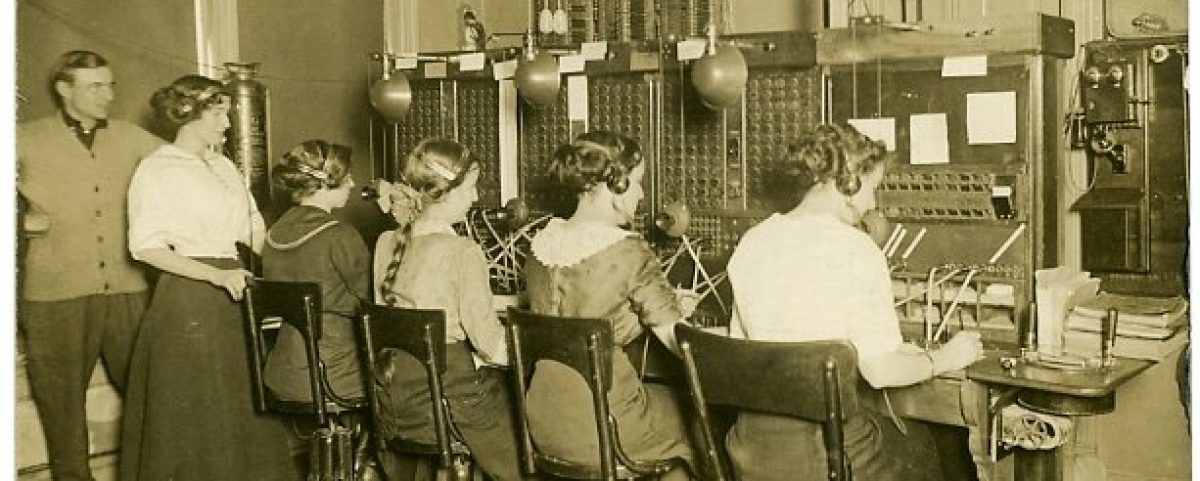When the Spanish Influenza struck in 1918, Delmarva’s essential workers paid a heavy toll serving on the front line of the struggle during the weeks the illness ripped across the Peninsula. That autumn the nation already grappled with the burden of World War I, when the first contagious cases broke out here.
As the virus spread rapidly from Wilmington and nearby military camps to Cape Charles, VA, and every point in between on Delmarva, phone company workers stood out as a group of essential workers struggling to maintain vital services. The war’s communications requirements had already taxed the system, considerably increasing demand on the wires. Then, the pandemic added further to this heavy load.
Operators hit by the flu
At that time, the network depended on operators working in tight quarters at exchanges to make connections for callers. These “hello girls” sat in rows at switchboards, almost elbow to elbow with other workers. Thus when the contagion started rampaging, the illness struck the central stations, depleting the ranks of operators at the same time sickness increased calls.
A young twenty-year-old, night operator at the Newark Telephone Exchange, Lee Roach, died on September 29. The Delaware College sophomore from Georgetown passed away at the college infirmary on that Sunday. The next day, the Student Army Training Corps escorted the body to the town limits, as the Newark undertaker transported the remains to Middletown to wait on the train for Georgetown. 1
By October 3, the Diamond State Phone Company seemed to have fallen victim to the flu as the company issued a plea. With at least twenty-five percent of its regular operating force on the sick list, the shortage crippled service. This resulted in a handful of women remaining at their posts, though much fatigued from the overwork of keeping the busy Wilmington exchange “plugged” night and day. To alleviate the problem, the company recruited “Inexperienced girls” to step in, and these hastily placed ladies did their best they could. But, many subscribers “grouched” at them as they struggled to learn the process and connect callers.2

With the growing pandemic came more and more calls to the switchboards as additional families fell victim to the killer virus. Plus, people became more or less afraid to mingle in public places, so they left their homes as infrequently as possible, but this too increased social and business transactions over the wires. In Maryland, the phone company took out an advertisement pleading for people to refrain from making unnecessary calls while also begging for experienced operators to volunteer during this time of trouble.
The Wilmington office also requested that only essential calls be made by phone. The war activities in the city had already strained the service, but calls to doctors, hospitals, the ambulance, drugstores, and undertakers created a more considerable strain. Many essential calls were being delayed as the operators connected conversations of no importance, the company reported. 3
overloading the exchange

As October slipped by, more reports arrived, indicating that the flu was crippling local exchanges in smaller towns around the Peninsula as many operators were quite sick. Some of the local managers at these places also suggested that people only make necessary calls after 10 p.m. when a skeleton crew was on duty overnight. The remaining operators worked heroically according to reports, but the task in city and country was burdensome, and at night, “these little girls throats are entirely exhausted. The public should be willing to relieve them as much as possible,” a paper reported.
In Elkton, nearly all the operators at the telephone exchange were seriously ill, so the phone company brought in operators from Salisbury 4. A similar situation existed in North East, the virus sweeping the office there, causing the exchange to shut down for a couple of days. In Chincoteague, the virus hit all the local operators hard so the phone company brought in Miss G. M. Fisher of Temperanceville and Miss S. V. Davis of Salisbury to run the office. 5
The malady also curtailed work on the lines as crews were depleted. A 27-year-old lineman, Frank N. Myer, installing long-distance wires through the Cecil County, died at Union Hospital during the first week of October. His remains were sent home to Chicago. 6
Things are different today, as we are connected in so many ways. But 102 years ago, the essential employees of the phone company performed heroic work, providing crucial communications with minimal disruption while doing risky work.

For more on the pandemic of 1918, see the Spanish Flu Archive
Endnotes- “Obituary.” Newark Post, October 2, 1918. https://chroniclingamerica.loc.gov/lccn/sn88053005/1918-10-02/ed-1/seq-1/#date1=1789&index=0&date2=1960&searchType=advanced&language=&sequence=0&lccn=sn88053005&words=Lee Roach&proxdistance=5&state=Delaware&rows=20&ortext=&proxtext=lee roach&phrasetext=&andtext=&dateFilterType=yearRange&page=1.[↩]
- “City Death Rate From Flu Grows; Epidemic Grip Continues.” Evening Journal. (Wilmington). October 10, 1918. https://www.newspapers.com/image/159913367/?terms=don’t+overburden+central.[↩]
- “Telephone Service Hampered Badly.” Morning News. (Wilmington). October 10, 1918. https://www.newspapers.com/image/159722342/?terms=telephone+service+hampered+badly+sickness+operators.[↩]
- Minor Locals, Cecil Democrat, October 26, 1918[↩]
- “Chincoteague,” Peninsula Enterprise, Accomac, Oct. 26, 1918[↩]
- “Deaths,” Cecil Democrat, (Elkton), October 5, 1918[↩]
